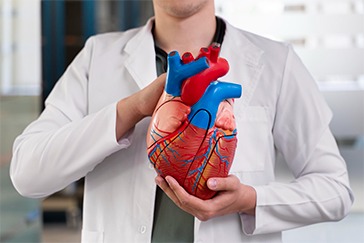 Book Appt.
Book Appt.
 Call Now
Call Now


Cardiac ablation (catheter ablation) is a minimally invasive procedure for irregular heart rhythms (arrhythmias). This treatment is used by healthcare experts to identify and treat aberrant tissue in the heart, which can help to rectify the rhythm. A cardiologist (heart doctor) performs a cardiac ablation operation by inserting a catheter (tube) into a blood artery leading to your heart. They utilize heat (radiofrequency ablation), cold (cryoablation), or short bursts of energy (pulsed field) to leave scars in the locations where the arrhythmia begins. These scars serve to block aberrant electrical impulses and avoid irregular beats.
Type of cardiac ablation
Cardiac ablation is the most common treatment for rapid cardiac arrhythmias; however, it is rarely the first option. Your physician may recommend this treatment if you have an irregular cardiac rhythm that medicines cannot correct. Your clinician will assess your heart and overall health to determine the best approach for treating the arrhythmia that affects you. A cardiac ablation technique can treat the following types of arrhythmias:
Procedure
Before performing a cardiac ablation procedure, you may need to:
During cardiac ablation
The provider will:
How long does it take to perform a heart ablation?
A cardiac ablation can take two to four hours to complete, but it is usually much longer. The exact time it takes varies from person to person.
What happens afterward?
After a cardiac ablation operation, you are sent to a recovery room and remain there for many hours. While you are recovering, a nurse will monitor your condition. You will need to stay in the hospital for six to eight hours following the treatment. Depending on your condition, you may be discharged the same day or spend the night in the hospital. When it is time to go home, you will be given specific instructions for at-home care. To assist avoid blood clots, your doctor may prescribe aspirin or another blood thinner. Depending on your medical history, you may need to take this medication for months or even years following the treatment.
Benefits
Cardiac ablation is a minimally invasive surgery that often does not need a lengthy hospital stay. When drugs fail, a cardiac ablation technique can help to restore a normal heart rhythm. In some situations, this treatment may save a person's life.
How successful is heart ablation?
The success rate of cardiac ablation varies depending on the type of irregular heart rhythm you have. People with SVT may have a 90-95% success rate. However, the success rate for Afib, atrial tachycardia, and ventricular tachycardia is only 60-80%.
Risks
Cardiac ablation hazards are minimal. People rarely experience difficulties, especially at hospitals that perform a large number of cardiac ablations. Blood clots, sheath or catheter-related blood vessel damage, damage to heart tissue or valves, infection or bleeding, stroke, and the necessity for a permanent pacemaker are all potential concerns. Radiofrequency catheter ablation does expose you to some radiation. Whether you are pregnant, consult with your doctor to see whether you may safely postpone the surgery until after you have given birth.
Conclusion
Cardiac ablation is a game-changing technique that restores normal heart rhythm and greatly improves quality of life for individuals with arrhythmias. While not without hazards, the advantages frequently outweigh the possible drawbacks. Patients can obtain optimal outcomes and live a healthier, more active life by comprehending the operation, properly preparing, and adhering to post-surgical protocols. If you're thinking about having cardiac ablation, talk to your cardiologist to see if it's right for you. A consistent heartbeat is easily achievable with adequate maintenance and lifestyle changes.
SHALBY Sanar International Hospitals provides extensive medical procedures backed up with our state-of-the-art technology and a team of highly qualified & experienced clinical experts.

Life-Changing TAVR Success Story | Dr. D.K. Jhamb | SHALBY Sanar International Hospitals

Timely Angiography Procedure Saves life of Iraqi Patient.

Rajiv Makhni, Managing Editor of NDTV, Shares His Experience at SHALBY Sanar International Hospitals

A successful treatment procedure helped Ms. Suri get over breathlessness
Our doctors pen down their research findings and experiences from time to time. Their words provide deep insight into the latest techniques, technologies and other advancements in healthcare. It provides expert answers to all kinds of health questions for real-life issues.
VIEW ALL




Since the day of its foundation, SHALBY Sanar International Hospitals is committed to provide comprehensive healthcare services. It regularly organizes awareness programs in its premises and encourages outdoor healthcare activities and camps with an intent to put focus on preventive healthcare.
VIEW ALL